With the future of abortion pills in legal jeopardy, more Americans say medication abortion should be legal than illegal in their state, according to a new Pew Research Center survey. The survey – conducted in the days before the conflicting court rulings on medication abortion by federal judges in Texas and Washington state – also finds stark divides by age and partisanship in Americans’ views of the issue.
Pew Research Center conducted this survey to assess the public’s attitudes about medication abortion. For this analysis, we surveyed 5,079 adults from March 27 to April 2, 2023. Everyone who took part in this survey is a member of the Center’s American Trends Panel (ATP), an online survey panel that is recruited through national, random sampling of residential addresses. This way nearly all U.S. adults have a chance of selection. The survey is weighted to be representative of the U.S. adult population by gender, race, ethnicity, partisan affiliation, education and other categories. Read more about the ATP’s methodology.
Here are the questions used for the analysis and its methodology.
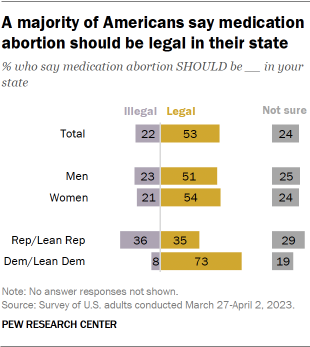
Overall, 53% of adults say medication abortion – that is, the use of a prescription pill or a series of pills to end a pregnancy – should be legal in their state, while fewer than half as many (22%) say it should be illegal. About a quarter (24%) say they aren’t sure.
As is the case with views about the legality of abortion overall, the Center survey, conducted from March 27 to April 2, finds that there are wide partisan divides in views of abortion pills.
A majority of Democrats and Democratic-leaning independents (73%) say medication abortion should be legal in their state, while fewer than half as many Republicans and GOP leaners (35%) say the same.
Americans’ perceptions about the prevalence of medication abortions in the U.S.
The survey also asked Americans, in an open-ended format, to estimate the percentage of all abortions in the U.S. that are medication abortions. In 2020, the most recent year with available data, medication abortions accounted for 53% of all facility-based abortions in the United States, according to data from both the Centers for Disease Control and Prevention and the Guttmacher Institute.
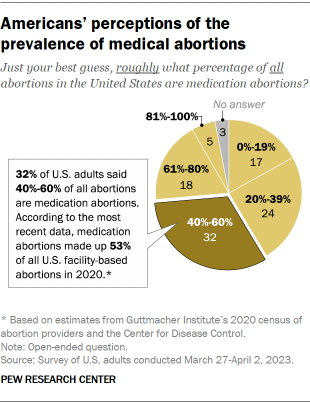
In the Center’s survey, about a third of adults estimate that 40% to 60% of abortions in the U.S. are medication abortions. About four-in-ten say medication abortions make up less than 40% of all abortions in the country. Roughly a quarter say they think medication abortions account for more than 60% of all abortions.
About a third of Republicans (32%) and Democrats (33%) alike estimate that medication abortions account for 40% to 60% of abortions in the country. However, Republicans are somewhat more likely than Democrats (46% vs. 36%) to estimate that medication abortions account for fewer than 40% all abortions. Democrats, in turn, are more likely than Republicans (29% vs. 19%) to say medication abortions account for 60% or more of all abortions in the U.S.
Demographic differences in views of whether medication abortion should be legal
Overall, younger adults are more likely than older Americans to say medication abortion should be legal in their state. Two-thirds (66%) of adults under 30 say abortion pills should be legal, compared with half of adults 30 and older.
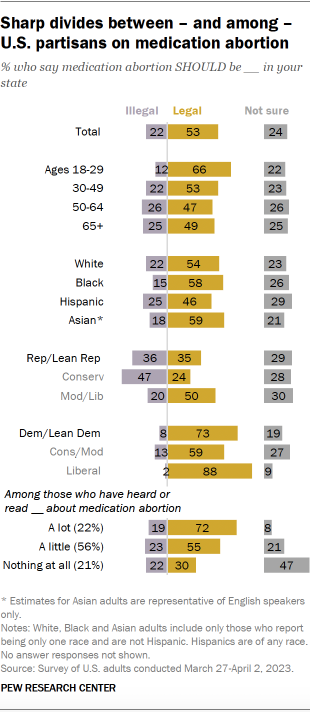
Opinions also vary by race and ethnicity. While majorities of White, Black and Asian adults say abortion pills should be legal in their state, views among Hispanic adults are slightly more mixed: 46% say they should be legal, while 25% say they should be illegal and 29% are not sure.
While there are stark partisan divides on the legality of medication abortion, there are also sizable ideological gaps within the parties.
Among Republicans and Republican-leaning independents, nearly half of conservatives (47%) say medication abortion should be illegal in their state, while 24% say it should be legal. But views among moderate and liberal Republicans are the reverse: Half say it should be legal, while 20% say it should be illegal.
While a majority of Democrats – regardless of ideology – say abortion pills should be legal, liberal Democrats are particularly likely to say this. Nearly nine-in-ten liberal Democrats (88%) say it should be legal, compared with 59% of conservative and moderate Democrats.
The survey, conducted prior to news of the court decisions issued April 7, finds that 22% of Americans say they have heard a lot about medication abortion. A majority (56%) have heard a little, while 21% say they have heard nothing at all.
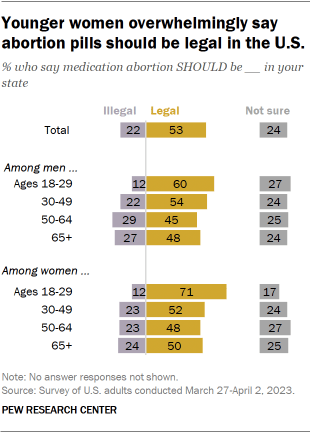
Among adults who said they’d heard or read a lot about medication abortion, 72% say it should be legal. This compares with 55% of adults who said they’d heard a little about medication abortion, and 30% who said they had heard nothing at all about it.
Younger women are particularly likely to say medication abortion should be legal in their state: 71% of women under 30 say this, while just 12% say it should be illegal. By comparison, about half of women 30 and older (51%) say medication abortion should be legal in their state.
There is a more modest age gap among men on this issue: Six-in-ten men under 30 say medication abortion should be legal in their state, compared with half of those 30 and older.
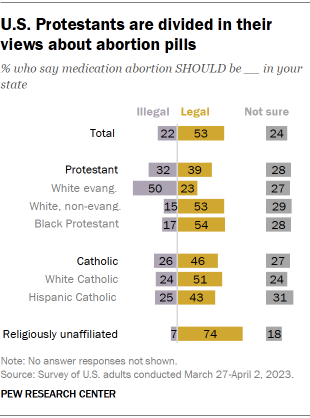
As is true with views of the legality of abortion overall, there are large divides by religion in Americans’ views of abortion pills. While Protestants overall offer mixed views about whether medication abortion should be legal in their state, White evangelical Protestants are about twice as likely to say it should be illegal than legal (50% vs. 23%). In contrast, slight majorities of White non-evangelical Protestants and Black Protestants say abortion pills should be legal.
Catholics are more likely to say abortion medication should be legal than illegal in their state (46% vs. 26%). Religiously unaffiliated adults overwhelmingly say it should be legal (74%). (Note: This analysis cannot report the views of Jews, Muslims, Buddhists, Hindus, Orthodox Christians and other smaller religious groups due to sample size limitations.)
Note: Here are the questions used for the analysis and its methodology.
